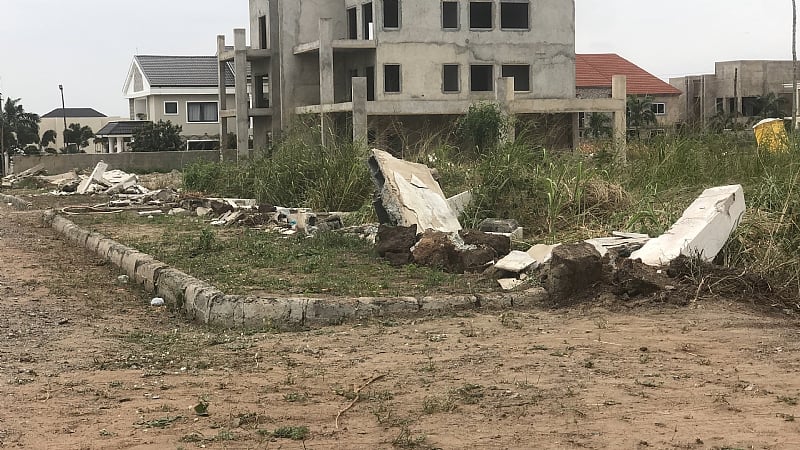The Muhajireen family, locked in a protracted land dispute with Trasaaco Valley, a prominent real estate developer in Ghana, has issued a stark warning against further encroachment on their 82-acre property located in Kanewu, Tema West Municipality. Acquired legally in 1981 with the intention of establishing an Islamic university, the land has become a battleground, with Trasaaco allegedly building on significant portions and now attempting to reclaim the section occupied by an existing Islamic school. The family contends that despite holding valid documentation and diligently paying ground rent to the Tema Development Corporation (TDC), they have faced years of harassment, encroachment, and intimidation, often facilitated by influential political figures and land guards acting on behalf of Trasaaco. This protracted conflict underscores deeper concerns about the vulnerability of land ownership rights, particularly for marginalized communities, in the face of powerful corporate interests and alleged political influence.
The Muhajireen family’s narrative, as presented by Malam Ali Ayornu, an Executive Member of the Shiawusa Foundation, paints a picture of persistent struggle against a well-resourced adversary. They accuse Trasaaco of exploiting their perceived weakness, using intimidation tactics to displace them from their land. The family’s frustration is palpable, their pleas for justice seemingly falling on deaf ears. Their accusations extend beyond Trasaaco, implicating government officials and even individuals within the Office of the National Chief Imam in a network of corruption, alleging that bribes in the form of money and houses were exchanged for abandoning their case. This claim throws a shadow over the integrity of institutions meant to protect the rights of citizens, further highlighting the family’s sense of powerlessness against a system they perceive as rigged against them.
The dispute reached a critical juncture four years ago when Trasaaco allegedly offered the family GH¢100,000 to relinquish their claim, a proposition they vehemently rejected. The conflict’s impact is acutely felt by the Islamic school operating on the disputed land. The family alleges that Trasaaco erected a fence around the school, denying students and staff access, forcing them to resort to climbing over the wall daily just to attend classes. This act, if true, represents a significant disruption to the educational pursuits of these children and underscores the lengths to which the developers allegedly went to assert their control over the property.
A glimmer of hope appeared with the intervention of then-President John Dramani Mahama, who, in response to a petition filed this year, ordered the deployment of soldiers to demolish the wall, restoring access to the school. This action, while welcomed by the family, is but one step in a long and arduous journey toward securing their land rights. The family emphasizes that the protracted dispute has emboldened other encroachers, further complicating the situation and highlighting the vulnerability of the land to opportunistic seizures in the midst of ongoing legal battles. They appeal to the government to intensify efforts to curb Trasaaco’s alleged harassment and ensure that Ghanaian citizens are not unjustly displaced under the guise of foreign investment.
Chief Sadik Jimah, Chairman of the National Council of Zongo Chiefs, representing the Chief Imam, corroborates the family’s claim, stating that the land was initially allocated to the Muslim community for the establishment of an ultra-modern university and educational complex, a project envisioned under the spiritual leadership of the National Chief Imam, Dr. Osman Nuhu Sharubutu. This reinforces the narrative that the land holds significant communal and religious importance, going beyond mere property ownership. Chief Jimah’s statement emphasizes the intended purpose of the land – education – which further underscores the injustice of its alleged appropriation for private development. His call for all parties to desist from encroachment serves as a public rebuke and a plea for respect for the designated purpose of the land.
The Muhajireen family’s predicament exemplifies a recurring challenge in Ghana and other developing nations: the struggle of marginalized communities to protect their land rights against powerful entities, often with alleged political backing. The case highlights the importance of transparent land governance, robust legal frameworks, and accessible justice systems to ensure that land ownership rights are respected and protected, regardless of social and economic status. The ongoing court case represents a critical juncture in this struggle. The family’s hope for justice rests on the court’s ability to impartially assess the evidence, resist external pressures, and deliver a verdict that upholds the rule of law and protects the rights of the rightful landowners. The outcome of this case will have far-reaching implications, not only for the Muhajireen family but also for the broader issue of land rights and the fight against alleged land grabbing in Ghana.


